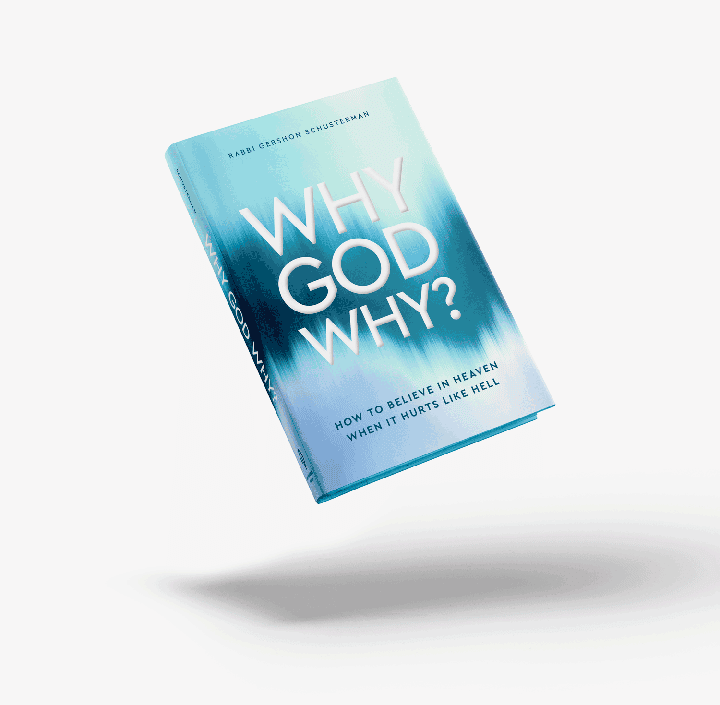
One sunny Sunday morning in 1986, Rabbi Gershon Schusterman was driving to his home in Long Beach, California when he received an alarming phone call from his wife, Rochel Leah. She told him she wasn’t feeling well, and he knew from the tone of her voice that it was serious. He rushed home and took her to the emergency room right away.

Schusterman sat in the lobby of the ER, saying Tehillim and praying to God that his wife was going to be fine. After an hour, he saw the doctor heading towards him.
“We did everything we could,” the doctor said. “But your wife didn’t make it.”
Schusterman thought: Rochel Leah was only 36 years old. How could she have suddenly passed away? She wasn’t sick. They had 11 children together, including 16-month-old twins. She was a beloved teacher at the day school where he was the director. How was he going to break the news to his children? How was he going to explain this to his community? And how was he going to move forward?
His next thought was, “why?” Even though he was a rabbi who had consoled many people who experienced tragedy, now that it was happening to him, he didn’t know how to react.
“I respected God and didn’t compromise my observance, but in my heart, I distanced myself from Him,” said Schusterman. “I had a grudge against God. I guess one can say I gave Him the cold shoulder.”
To process his emotions and help his community at the same time, a few months after Rochel Leah’s death, Schusterman taught a seven-week class on the topic, “Do bad things happen to good people?” In it were the seeds for his new book, “Why God Why? How to Believe in Heaven When it Hurts Like Hell,” which details his own traumatic experience and explores Judaism’s teachings surrounding tragedy.
The book does not attempt to give a definitive answer as to why there is suffering in the world. That would be presumptuous and ludicrous, Schusterman says. Rather, it offers a number of different perspectives from the Torah in which the reader may be able to find comfort. There are chapters on what evil really is, how tragedy can refine us, the afterlife, whether or not suffering is a test of faith and the Holocaust.
There is also a chapter on if it’s OK to be angry with God. In the immediate aftermath of his wife’s passing, Schusterman was in sink-or-swim mode trying to take care of his family, work and look after his community. He didn’t have time to process his emotions or examine his relationship with God.
“I resisted allowing myself to be angry at God,” he writes. “Rather, I was in deep shock and pain, bewildered by the new and intensely challenging circumstances suddenly thrust upon me and my family. I didn’t have the emotional language to articulate my feelings at that time. But as I imagine you have experienced, when you don’t express important, urgent feelings, they eat away at you and wreak havoc.”
Two years after Rochel Leah died, Schusterman got remarried to his current wife, Chana Rachel. A few years after that, they were on vacation in Israel when he broke down in the middle of Jerusalem. Finally, all his feelings were coming to the surface. He couldn’t suppress them anymore.
“My wife asked me how I was doing, and I was suddenly got dizzy and felt the world spinning around me,” he said. “I was experiencing an intense psychic pain. My mind flashed through all those events of the past few years.”
Schusterman realized he needed to contend with his feelings, so he spent part of the rest of his two-week-long trip going to intensive therapy for two hours a day.
“I didn’t grieve adequately,” he said. “And I had unfinished business with God.”
While Schusterman said he felt distanced from God after his wife’s passing, feeling a range of emotions, including anger, is completely normal in light of such loss. According to the rabbi, the Talmud states that a person is not held accountable for things he says against God in anger after he experiences a tragedy.
“God has broad shoulders,” he said. “He doesn’t reject a person who speaks out of line during a crisis. When that person calms down, God will take him back lovingly.”
Along with touching upon anger, in “Why God Why?” Schusterman discusses the ideas about God that Rabbi Harold Kushner described in his book, “When Bad Things Happen to Good People.” While Kushner believed that evil was not in God’s control―and we could let God off the hook for it―Schusterman writes that this is not inherently a Jewish idea.
“Jews believe that God is firmly in control of every corner of the universe, and, as hard as that may be to understand, bad things can happen to decent people,” he says. “In a way, it’s a simpler course to throw up one’s hands and say, ‘There are forces beyond God’s purview, and those forces are to blame for whatever unfortunate or evil things happens in the world.’ God’s role would then be that of the Sympathizer and Comforter-in- Chief Who sits on the sidelines. But again, that’s not a Jewish approach.”
“Jews believe that God is firmly in control of every corner of the universe, and, as hard as that may be to understand, bad things can happen to decent people.”
– Gershon Schusterman
Schusterman also explains how tragedy can make us better people and bring positivity into the world. In one poignant passage, he includes a story from a Viktor Frankl book: A mother is wearing a bracelet made of nine baby teeth all mounted in gold, and her doctor asks her what they represent. The teeth are of her nine children who died in the Holocaust, she says. The doctor asks her how she copes with that reality, and she states that she operates an orphanage.
In his own life, Schusterman became much more empathetic to people who had experienced something tragic.
“Until this tragedy happened to me, I had gone to many shiva homes and said the right things but, I have to admit, it was superficial because I couldn’t feel what they were feeling,” he said. “When I experienced it myself, I knew what they were going through. Chazal say that ‘words that come from the heart enter the heart.’”
The Jewish approaches Schusterman details in “Why God Why?” are that we do not, and cannot know God’s ultimate “mind,” as He is the Creator and we are creatures of His creation. Jews believe in an afterlife, one where souls reunite with God, as well as the recycling of souls that need to come back to the world and complete their mission before they can be at one with God.
Whether someone is currently mourning the loss of a loved one or hasn’t healed from old wounds, Schusterman believes his book can help them handle their pain and process what happened to them. It can teach them that while we can’t avoid pain, we do not have to suffer.
“I hope people find comfort and consolation after they read my book and learn how to engage with God,” he said. “The worst relationship a Jew can have with God is an apathetic one. By engaging in a time of crisis, there is an opening for a deeper relationship with God.”
“Why God Why? How to Believe in Heaven When it Hurts Like Hell” is available for purchase on Amazon.com.






















 More news and opinions than at a Shabbat dinner, right in your inbox.
More news and opinions than at a Shabbat dinner, right in your inbox.